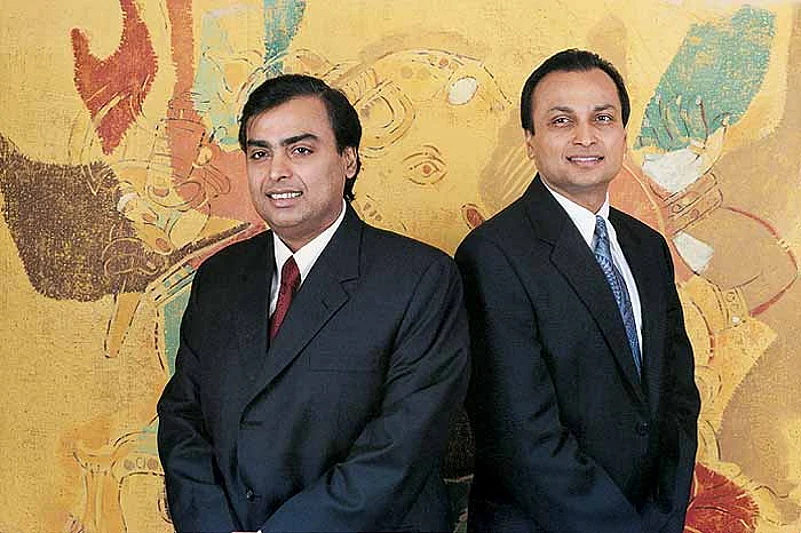The New Gas Deal
- Two weeks after SC verdict on gas feud, Ambanis do away with non-compete agreement
- Mukesh benefits via greater opportunities in infrastructure, earlier Anil’s turf
- Plan crafted to ‘compensate’ Anil’s loss on gas front
- Mukesh to seek policy change to negotiate gas supplies for Anil’s proposed power plant
- Government likely to “accommodate” Anil’s plans
***
Even though the martial tunes have softened to signify a thaw between the feuding Ambani brothers, the timing, and motive, behind the recent truce remain a mystery. The curious drop in the tempo of belligerence shows that this family drama continues to have an ambiguous ending—everyone is still trying to fathom the implications. Can we now expect an end to those five years of open, bitter war? Or, coming as it does soon after India’s highest court’s verdict on the sale of gas between the two brothers, can we conclude the truce is a well-crafted move to ensure that the Ambani family comes out on top—come what may?
Analysts agree that revoking the no-compete clause etched five years ago is a positive development. “The new agreement has brought sanctity because it’s not between two individuals, but between the boards of the two companies,” says Arun Kejriwal, strategist kris Research. Now, the brothers will be free to compete instead of expending their energies on sabotaging each other’s plans. Mukesh Ambani stands to benefit more, as RIL will now be able to leverage its surplus funds to diversify into areas like power and roads, where the no-compete pact was proving a barrier.
The only area where the non-compete agreement will still hold good is Anil Ambani’s gas-based power plants till 2022. Even so, going by the market’s bearish view on ADAG stocks, there’s a feeling that Anil comes out poorer after the truce. Is it that simple? “Surprised by the suddenness of the move”, analysts feel the pact is likely to be part of ‘Plan B’ of the 2005 division of Dhirubhai Ambani’s assets. Five years ago, the de-merger deal was worked out by Ambani matriarch Kokilaben, and pushed through with help from family “well wishers” like K.V. Kamath and the late R.K. Mishra.
Interestingly, this time around, no one wants to be identified as being a peacemaker. Even Union petroleum minister Murli Deora declined to comment, wondering aloud, “If I go on talking about it, I don’t know what will happen.” Government sources, however, agree that there was intense political pressure brought on the brothers to “cease and desist in the greater national interest”. But that was hardly a new demand, from the prime minister downwards.
At least officially, the government’s reaction to the court outcome is at best lukewarm. As yet, consensus hasn’t been reached on “whether it is the end of war or just the court room litigations”. As a PMO source put it, “It is a private settlement that is hanging loose. We will have to wait for the real unfolding of events over a period of time to know if there has been a real settlement.”
From a position of strength, when he seemed likely to take a giant share of RIL’s gas assets at a lower than market price, Anil today is waiting in a queue for the government to help him fuel his dream gas-power projects. The empowered group of ministers headed by the finance minister is still to take a call on whether to allocate gas for new power projects like Anil’s. Also, it is yet to sanction an enhanced tenure of 17 years for gas-based projects (which stands at five years at present).
“The government does not care whether the two brothers compete. It is only concerned that a scarce national resource like gas must be optimally used for fertilizer or power generation and should be priced properly,” stresses energy expert Kirit S. Parikh, who credits the Supreme Court verdict for pushing the brothers to “go back to settling matters within the family”.
Post the SC verdict, Anil has lost out on a major share of his “future” assets—and first right of refusal for 40 per cent share of all future discoveries by RIL. To compensate for it, the Ambani family has crafted Plan B. It has already seen big brother approaching the prime minister to accommodate ADAG’s gas-based power generation ambition.
Many also share the view that the new pact comes with a fund transfer component. “We can draw the inference that it could not have happened without having cash being paid by RIL. In the days ahead, developments could show the trend if RIL acquires (Anil’s) RNRL,” says investment analyst S.P. Tulsian. For the compensation package to be implemented, it was important to do away with the no-compete clause, as “it is a legal requirement in case they want to switch companies,” explains Deven Choksey, managing director of K.R. Choksey Shares and Securities.
In the current scenario, where Anil is facing a huge cash infusion pressure for his projects, an arrangement that enables him to hive off the gas trading company to his brother is helpful. As analysts point out, Anil seems to have lost his “fan following”, which is best illustrated by the postponement, twice, of Reliance Infratel’s IPO. This is a far cry from 2008, when Anil was able to raise Rs 11,000 crore in the domestic market and $500 million overseas to finance his Reliance Power plans.
Will the brothers’ gamble of smoking a peace pipe pay off? So far, the government is yet to finalise plans for further allocation of D-6 KG Basin gas. Official sources, however, are confident that the government may make a case for Anil as all along, the EGOM “has kept aside the quantity required to meet NTPC and Anil’s Dadri power plant requirement” while it waited for SC verdict.
Oil and gas experts agree that the government would be amenable to “sorting out” the issue. As former power secretary Anil Razdan, who is an advisor to the government, opines, “I would prefer gas supply agreements to be for the life of the plant (unless it is a merchant power plant) for easy financial closure.” So now, all that’s needed is the final push from Mukesh in getting the government to accommodate Anil’s gas requirement. As they say, come what may, the Ambani show must go on.


























